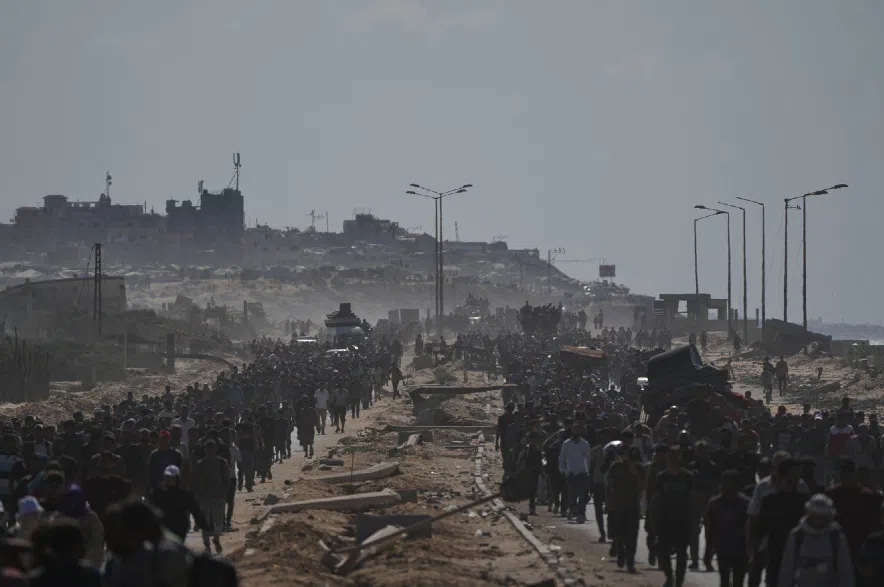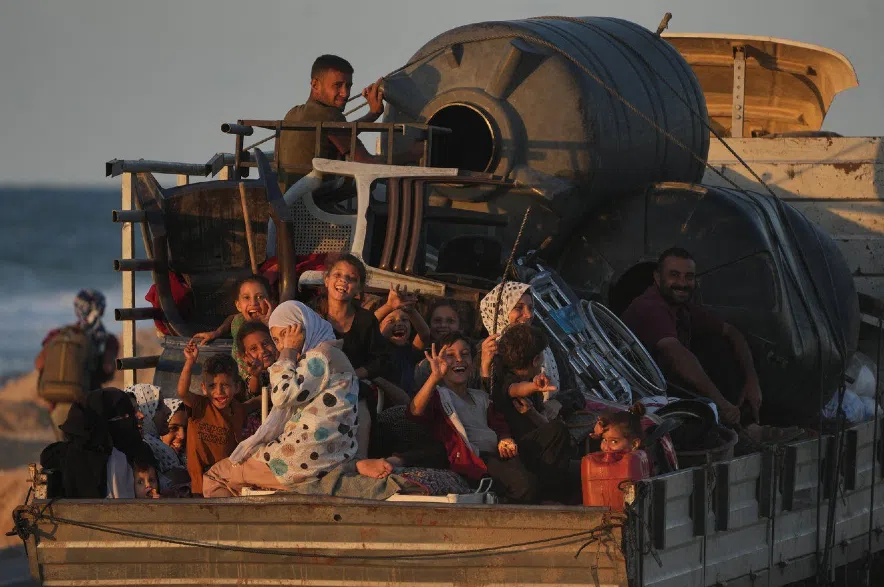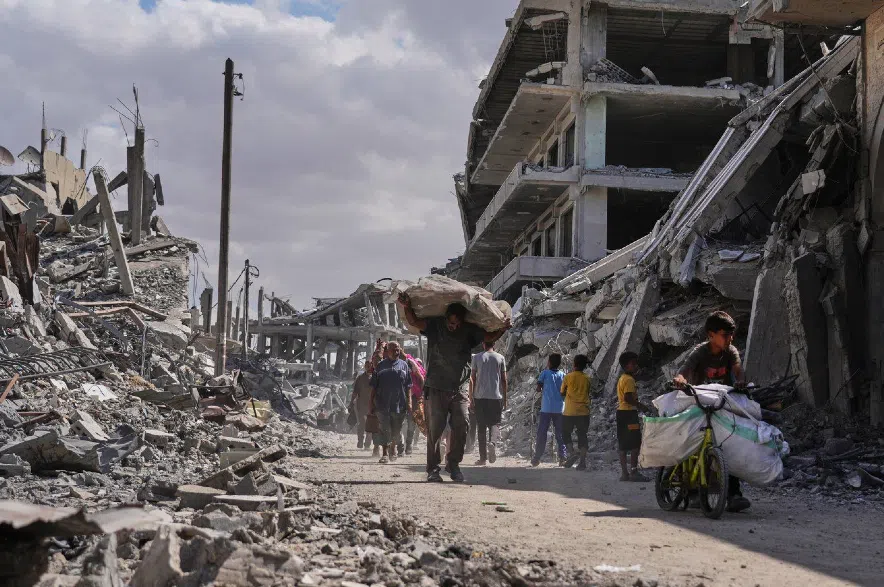The two-year war between Israel and Hamas has been paused, with both sides agreeing to the release of Israeli hostages in exchange for Palestinian prisoners.
But, even in the first phase of a peace deal there’s uncertainty on whether it will last.
Read more:
- Gaza peace plan agreed to, Canada calls for immediate and unimpeded aid
- Those in Canada with loved ones in Middle East hopeful about Hamas-Israel peace plan
Asmaa Olwan is a member of Palestinian Solidarity in Regina. She’s originally from Gaza, having moved to Canada in 2000, and still has siblings with families living there.
Olwan said she had mixed feelings when she heard about the deal.
“For us to hear the peace agreements now, the ceasefire agreements, it’s a big relief for us,” she said.
These last two years she said she’s held a lot of guilt as families in the region live “under the war and the genocide,” while she stays safe in Canada.
According to Olwan, every morning these last two years she’d have to get up not knowing if she was waking up to bad news, saying she’s had friends who’ve died.

Displaced Palestinians walk with their belongings along the coastal road near Wadi Gaza in the central Gaza Strip, moving toward Gaza City, Friday, Oct. 10, 2025, after Israel and Hamas have agreed to a pause in their war and the release of the remaining hostages. (AP Photo/Abdel Kareem Hana)
But, it’s not just those with Palestinian relatives who felt a sense of relief to the news of a ceasefire.
“Enough already is how I feel. Finally, an opportunity to put an end to this horrible reality,” Jeremy Parnes, Rabbi of Regina’s Beth Jacob Synagogue, said.
“It looks like we’re finally moving in the right direction.”
Parnes, who has family in Jerusalem, is optimistic about the peace deal, saying his only choice is to believe it will last. But Olwan’s relief comes with a lot more skepticism.
“This has been (happening) for two years. It’s hard to believe, actually. We are so excited, but it’s hard to believe,” she said.
Olwan said she doesn’t trust that the deal signifies the end of the war, adding how the Israeli government has repeatedly broken its promises.
While their optimism on the longevity of the ceasefire differs, Olwan and Parnes both expressed concern for Palestinians in Gaza.
“It has been two years of suffering under oppression, killing, genocide, starving,” Olwan said. “They need relief. They need time to heal. They need a lot of things.”
“My heart goes out to Palestinian people who have had to be stuck in the middle of this while it’s been going on,” Parnes said. “To me, it’s just horrible and I just want to see the end of it.”

A displaced Palestinian family rides on a truck loaded with water tanks, furniture and other belongings as they travel along the coastal road near Wadi Gaza in the central Gaza Strip, heading toward Gaza City, Friday, Oct. 10, 2025, after Israel and Hamas agreed to a pause in their war and the release of the remaining hostages. (AP Photo/Abdel Kareem Hana)
What comes next?
Olwan said people in Gaza will need to properly bury their loved ones and deal with the emotions from this war before rebuilding everything from scratch.
Even though she described the ceasefire as bringing an end to “this nightmare,” Olwan said it’s hard to celebrate when so many people are dead.
For Parnes, the focus is on peace for both Palestinians and Israelis.
That will involve, “a more stable, reliable government or some kind of authority in Gaza, for example, that will allow those poor people to actually experience some normality in their lives and for us as Jews and Israelis to be able to live in peace,” he said.
Parnes said what’s sometimes missed is that many Jewish people didn’t want the war and he emphasized the need for stability in the “only country for Jews.”
There’s still a lot of uncertainty about how the peace plan will advance following this first phase, including how and if Hamas will disarm and who will govern Gaza.
The latest truce nevertheless marks a key step toward ending a ruinous two-year war that was triggered by Hamas’ 2023 attack on Israel. The fighting has killed tens of thousands of Palestinians and displaced around 90 per cent of the Gaza population of some 2 million, often multiple times. Many of them will find fields of rubble where their homes once stood.
Meanwhile, the United Nations was given the green light by Israel to begin delivering scaled-up aid into Gaza starting Sunday, a U.N. official said. The official spoke on the condition of anonymity to discuss details not yet made public.
The aid shipments are meant to address severe malnutrition and famine conditions triggered by Israeli offensives and restrictions on humanitarian help. The International Criminal Court is seeking the arrest of Netanyahu and his former defense minister for allegedly using starvation as a method of war. Israeli officials deny the accusations.
The aid will include 170,000 metric tons that have already been positioned in neighbouring countries such as Jordan and Egypt as humanitarian officials awaited permission from Israeli forces to restart their work.
U.N. officials and Israeli authorities have engaged in a series of discussions in Jerusalem over the last 24 hours about the volume of aid humanitarian organizations can bring in and through which entry points.
U.N. spokesperson Stephane Dujarric told reporters Friday that fuel, medical supplies and other critical materials have started flowing through the Kerem Shalom crossing. U.N. officials want Israel to open more border crossings and provide safe movement for aid workers and civilians who are returning to parts of Gaza that were under heavy fire until only recently.
— with files from The Canadian Press and Associated Press
Read more:











